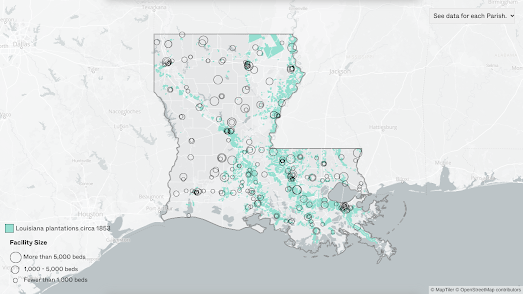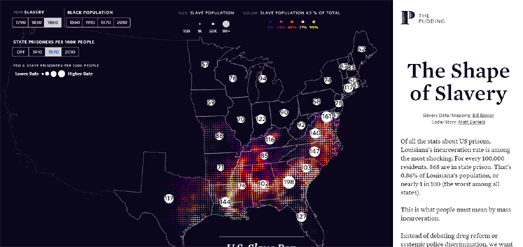The state of Louisiana likes putting its citizens in jail. Nearly 1 in every 100 Louisiana residents are locked up in a state prison or local jail. The reasons for Louisiana's high incarceration rates are simple. It isn't because Louisiana is full of criminals. It is because of racism and the profits to be made from enforced slave labor.
I arrived at this conclusion after reading the Vera Institute of Justice's project Louisiana Locked Up: A Problem in Every Parish. Not that Vera ever expressly cites racism in its report - but the implications are very clear from the data. Vera's data driven investigation of Louisiana's incarceration problems uses a story-map format to investigate the rates, results and causes of why this southern state imprisons so many of its residents.
The report includes many maps, including maps which show the incarceration rates in each of the state's parishes. According to the map "the prison admission rate is greater than the national average in 92 percent of parishes and more than twice the national average in 63 percent of parishes."
One very damning map layer juxtaposes the location of the state's prisons and jails with the location of historical plantations. According to Vera:
"The state’s largest jails and prisons are situated squarely on the same land where Black people were enslaved to sustain the state’s agricultural industry. These facilities now use the forced labor of incarcerated people (who are disproportionally Black) to sustain the “corrections” industry."
In 2018 The Pudding used 150 years of census and incarceration data to explore the legacy of slavery on modern incarceration rates in the United States. The Pudding's The Shape of Slavery allows you to view the 1860 distribution of slaves in the Southern States alongside present day incarceration rates in each state.
America likes to put people behind bars. The NAACP reports that 21% of the entire world's prison population is living in American jails. This propensity to lock up its citizens affects African Americans more than most other Americans. The NAACP says that African Americans are incarcerated at nearly five times the rate of white Americans.
There is a geographical factor at play in these incarceration rates. The Prison Policy Initiative states that "the South has consistently had a higher rate of incarceration than the other regions of the United States". The Pudding decided to explore if there was any connection between the high rate of incarceration in Southern states and the legacy of slavery. By mapping 150 years of census and incarceration data they wanted to see if historic incarceration rates differ between the former slave states and the non-slave states of the North.
They do. The Pudding concludes that "we still see the shadow of the undeniable, institutionalized, strategic racism of the 100 years after the Civil War".



I want to object to your statement that ‚Lousiana is not full of criminals‘. In fact the crime rate in Lousiana is extremely high! The homicide rate for example is the second highest in the US, just behind Mississippi, four times higher than in New York, more than ten times higher than in Maine! So there IS more crime and more criminals in Louisiana than in other places and thus higher incarceration rates are not necessarily a sign of racism. The real problem we should focus on is why there is more crime in this state and how it affects the people living there and how crime can better be prevented!
ReplyDeleteThere are obviously more criminals (because of the huge number of people locked up) but does that necessarily mean there is more crime. Things like prosecution rates and the lengths of sentences will also affect the number of people incarcerated.
ReplyDeleteThe percentage of Louisiana citizens in jail is among the highest in the world. Are Louisianians really the most criminal people in the world or do other factors also contribute to this extremely high rate of incarceration?